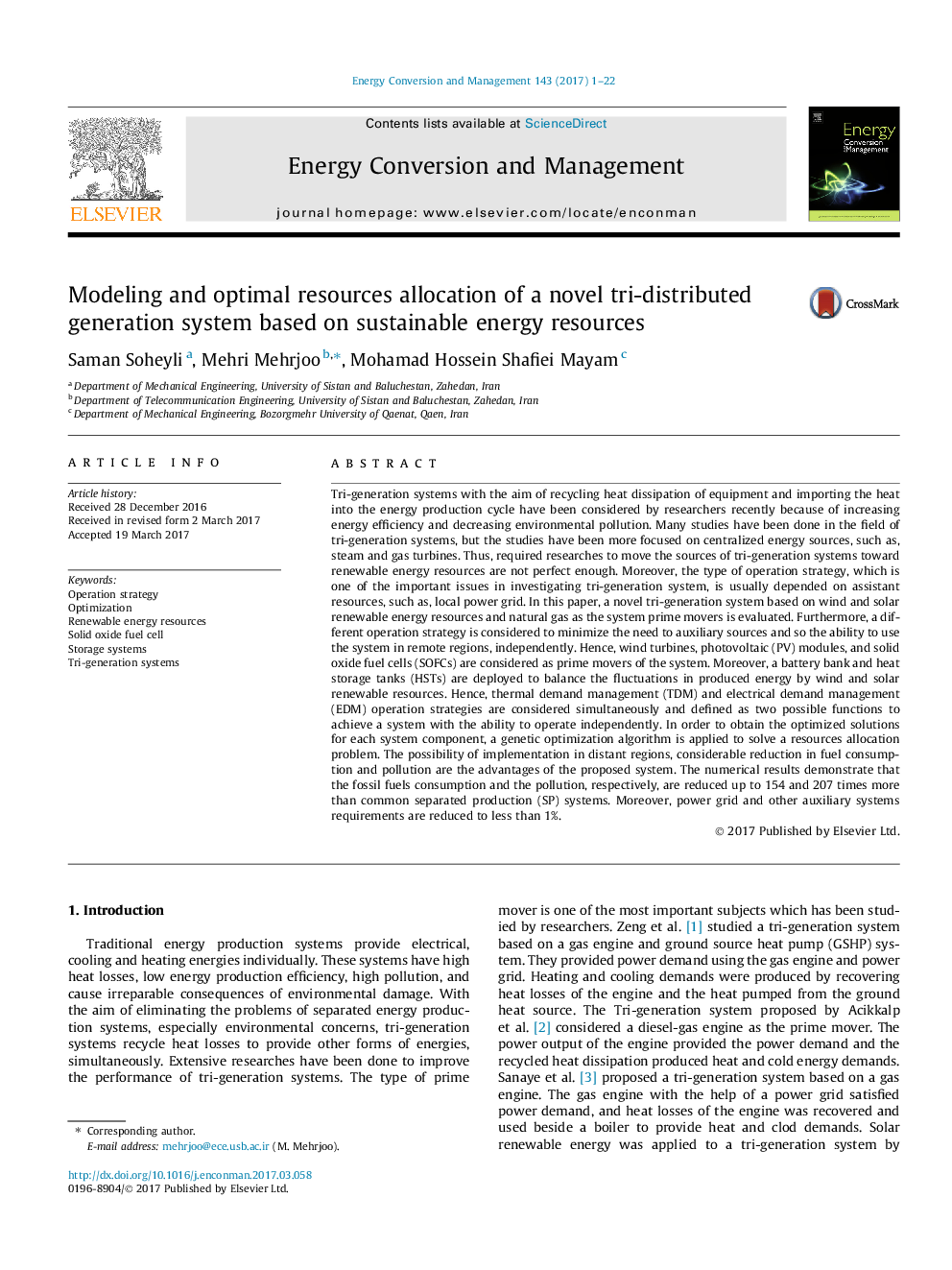| کد مقاله | کد نشریه | سال انتشار | مقاله انگلیسی | نسخه تمام متن |
|---|---|---|---|---|
| 5012771 | 1462819 | 2017 | 22 صفحه PDF | دانلود رایگان |
عنوان انگلیسی مقاله ISI
Modeling and optimal resources allocation of a novel tri-distributed generation system based on sustainable energy resources
ترجمه فارسی عنوان
مدل سازی و بهینه سازی تخصیص منابع یک سیستم جدید توزیع پراکنده بر مبنای منابع انرژی پایدار
دانلود مقاله + سفارش ترجمه
دانلود مقاله ISI انگلیسی
رایگان برای ایرانیان
کلمات کلیدی
استراتژی عملیاتی، بهینه سازی، منابع انرژی قابل تجدید، سلول سوختی اکسید جامد، سیستم های ذخیره سازی، سیستم های سه گانه،
موضوعات مرتبط
مهندسی و علوم پایه
مهندسی انرژی
انرژی (عمومی)
چکیده انگلیسی
Tri-generation systems with the aim of recycling heat dissipation of equipment and importing the heat into the energy production cycle have been considered by researchers recently because of increasing energy efficiency and decreasing environmental pollution. Many studies have been done in the field of tri-generation systems, but the studies have been more focused on centralized energy sources, such as, steam and gas turbines. Thus, required researches to move the sources of tri-generation systems toward renewable energy resources are not perfect enough. Moreover, the type of operation strategy, which is one of the important issues in investigating tri-generation system, is usually depended on assistant resources, such as, local power grid. In this paper, a novel tri-generation system based on wind and solar renewable energy resources and natural gas as the system prime movers is evaluated. Furthermore, a different operation strategy is considered to minimize the need to auxiliary sources and so the ability to use the system in remote regions, independently. Hence, wind turbines, photovoltaic (PV) modules, and solid oxide fuel cells (SOFCs) are considered as prime movers of the system. Moreover, a battery bank and heat storage tanks (HSTs) are deployed to balance the fluctuations in produced energy by wind and solar renewable resources. Hence, thermal demand management (TDM) and electrical demand management (EDM) operation strategies are considered simultaneously and defined as two possible functions to achieve a system with the ability to operate independently. In order to obtain the optimized solutions for each system component, a genetic optimization algorithm is applied to solve a resources allocation problem. The possibility of implementation in distant regions, considerable reduction in fuel consumption and pollution are the advantages of the proposed system. The numerical results demonstrate that the fossil fuels consumption and the pollution, respectively, are reduced up to 154 and 207 times more than common separated production (SP) systems. Moreover, power grid and other auxiliary systems requirements are reduced to less than 1%.
ناشر
Database: Elsevier - ScienceDirect (ساینس دایرکت)
Journal: Energy Conversion and Management - Volume 143, 1 July 2017, Pages 1-22
Journal: Energy Conversion and Management - Volume 143, 1 July 2017, Pages 1-22
نویسندگان
Saman Soheyli, Mehri Mehrjoo, Mohamad Hossein Shafiei Mayam,
